

The Afterlife Hall Of Judgement – 42 Questions. In Ancient Egypt the Judgement of The Dead took place in the Hall of Maat.
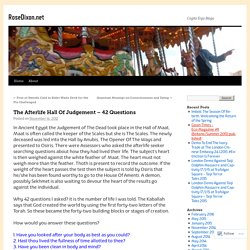
Maat is often called the keeper of the Scales but she is The Scales. The newly deceased was led into the Hall by Anubis, The Opener Of The Ways and presented to Osiris. There were Assessors who asked the afterlife seeker searching questions about how they had lived their life. The subject’s heart is then weighed against the white feather of Maat. The heart must not weigh more than the feather. Why 42 questions I asked? How would you answer these questions?
1. 42. The last question is the one that would save most people. Oh I can imagine people frowning now and saying what about murderers and the like? Shall I or shall I not tell you? My late mother and I had a challenging relationship since I was born. Spinoza - Metaphysical Thoughts: Part 2, Chapter 1. We have said above that in Nature nothing is given except substance and modes.
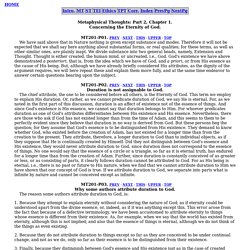
Therefore it will not be expected that we shall say here anything about substantial forms, or real qualities; for these terms, as well as other similar ones, are plainly inapt. We divide substance into two general heads, namely, Extension and Thought. Thought is either created, the human mind, or uncreated, i.e., God. God's existence we have above demonstrated a posteriori, that is, from the idea which we have of God, and a priori, or from His essence as the cause of His being. Spinoza - Metaphysical Thoughts: Part 1, Chapter 2.
In order that it may be known what content to give to these four terms, it is necessary that we should understand clearly what may be said of uncreated substance, or God.
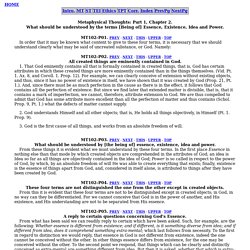
Namely: 1. That God eminently contains all that is formally contained in created things, that is, God has certain attributes in which these created things are more eminently contained than in the things themselves. An Enquiry Concerning Human Understanding. An Enquiry Concerning Human Understanding is a book by the Scottish empiricist philosopher David Hume, published in English in 1748.[1] It was a revision of an earlier effort, Hume's A Treatise of Human Nature, published anonymously in London in 1739–40.
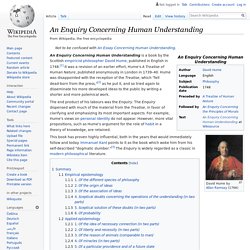
Hume was disappointed with the reception of the Treatise, which "fell dead-born from the press,"[2] as he put it, and so tried again to disseminate his more developed ideas to the public by writing a shorter and more polemical work. This book has proven highly influential, both in the years that would immediately follow and today. Immanuel Kant points to it as the book which woke him from his self-described "dogmatic slumber. Nikolai Berdyaev. Nikolai Berdyaev Nikolai Alexandrovich Berdyaev (Николай Александрович Бердяев) (March 18, 1874 – March 24, 1948) was a Russian religious and political philosopher.
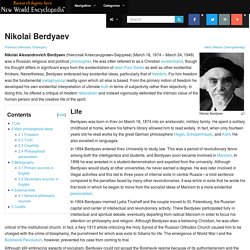
He was often referred to as a Christian existentialist, though his thought differs in significant ways from the existentialism of Jean-Paul Sartre as well as other existential thinkers. Nevertheless, Berdyaev embraced key existential ideas, particularly that of freedom. For him freedom was the fundamental metaphysical reality upon which all else is based. From the primary notion of freedom he developed his own existential interpretation of ultimate truth in terms of subjectivity rather than objectivity. Life Berdyaev was born in Kiev on March 18, 1874 into an aristocratic, military family. In 1894 Berdyaev entered Kiev University to study law. In 1904 Berdyaev married Lydia Trusheff and the couple moved to St. Main philosophical ideas Freedom. Principle of Sufficient Reason. 1. Introduction Suppose you enter a farmers’ market, pick out a few cucumbers and ask the merchant for the price. “Five dollars a pound”. A bit expensive, you may think, but you pay.
Before you leave the stand two other people approach the seller with the very same question (“How much are the cucumbers?”). A simple formulation of the principle is as follows: (1) For every fact F, there must be a sufficient reason why F is the case. The term “fact” in the above formulation is not intended to express any commitment to an ontology of facts. . (2) For every x, there is a y such that y is the sufficient reason for x (formally: ∀x∃yRyx [where “Rxy” denotes the binary relation of providing a sufficient reason]). Critique of Judgment. The Critique of Judgment (Kritik der Urteilskraft), also translated as the Critique of the Power of Judgment, is a 1790 book by the German philosopher Immanuel Kant.
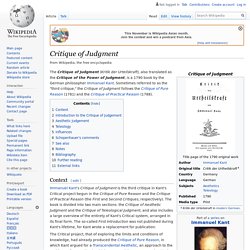
Sometimes referred to as the "third critique," the Critique of Judgment follows the Critique of Pure Reason (1781) and the Critique of Practical Reason (1788). Context[edit] Immanuel Kant's Critique of Judgment is the third critique in Kant's Critical project begun in the Critique of Pure Reason and the Critique of Practical Reason (the First and Second Critiques, respectively).
The book is divided into two main sections: the Critique of Aesthetic Judgment and the Critique of Teleological Judgment, and also includes a large overview of the entirety of Kant's Critical system, arranged in its final form. The so-called First Introduction was not published during Kant's lifetime, for Kant wrote a replacement for publication. Introduction to the Critique of Judgement[edit] Aesthetic Judgement[edit] Teleology[edit] Influences[edit]
Causality. The law of causality is the law of identity applied to action.
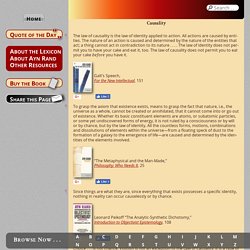
All actions are caused by entities. The nature of an action is caused and determined by the nature of the entities that act; a thing cannot act in contradiction to its nature . . . . The law of identity does not permit you to have your cake and eat it, too. The law of causality does not permit you to eat your cake before you have it. To grasp the axiom that existence exists, means to grasp the fact that nature, i.e., the universe as a whole, cannot be created or annihilated, that it cannot come into or go out of existence. Since things are what they are, since everything that exists possesses a specific identity, nothing in reality can occur causelessly or by chance.
Choice . . . is not chance. See also: Change; Final Causation; Free Will; Identity; Miracles; Necessity.